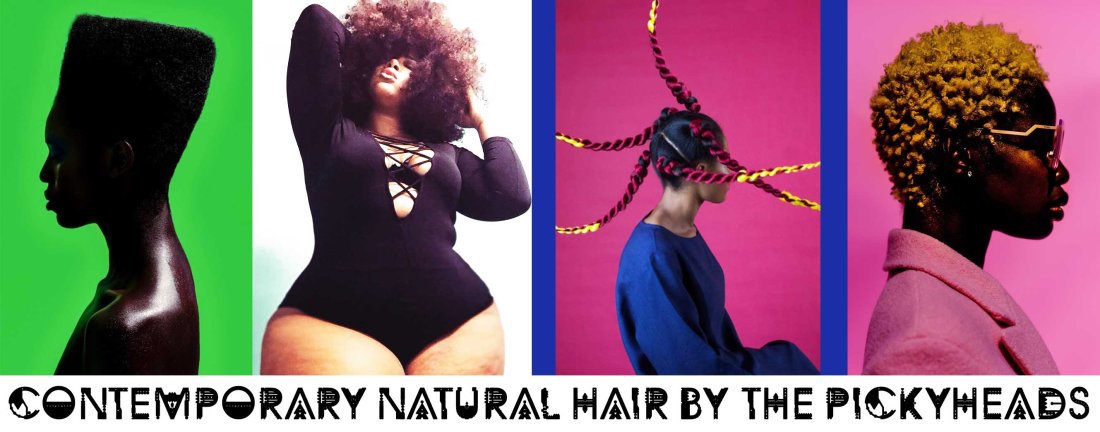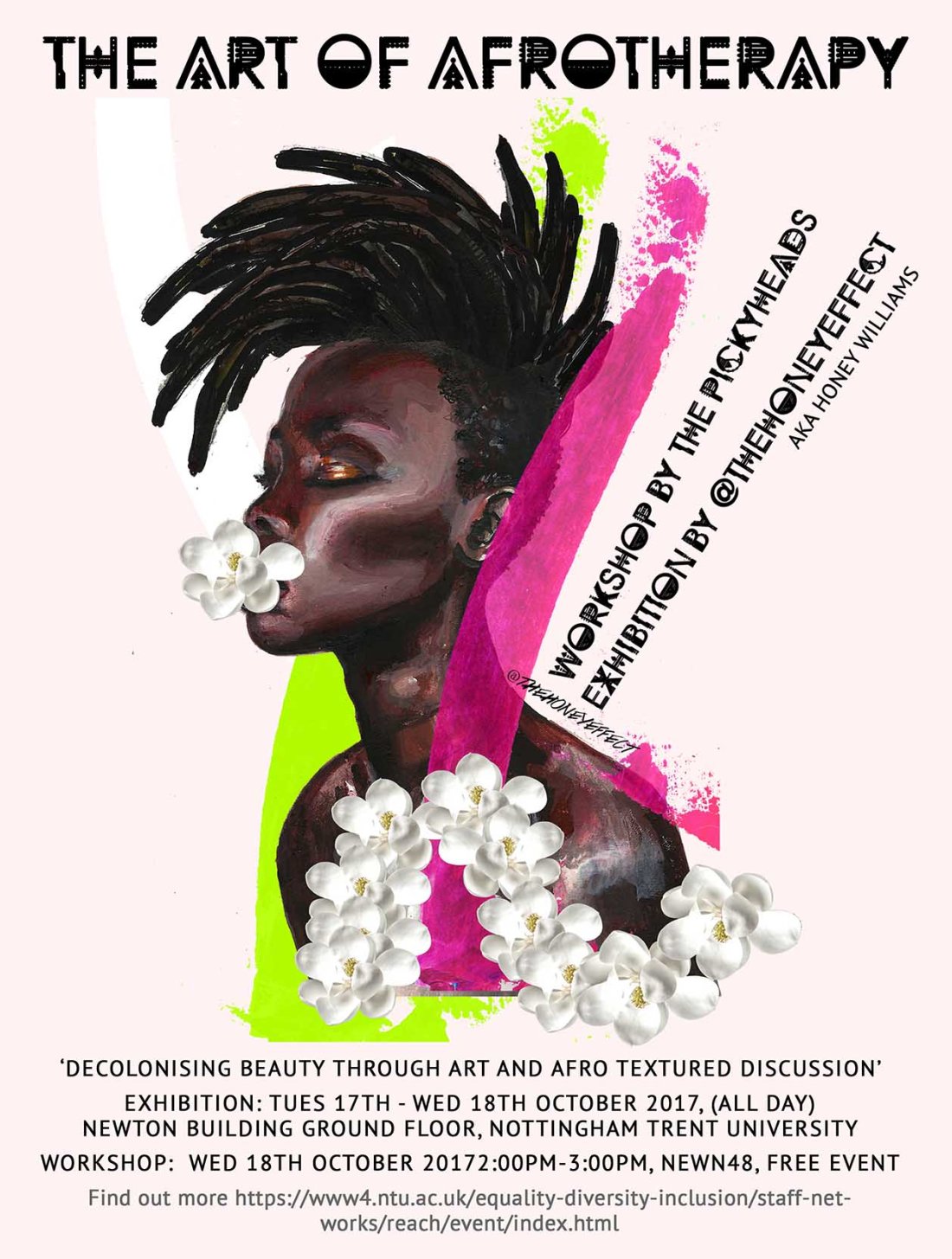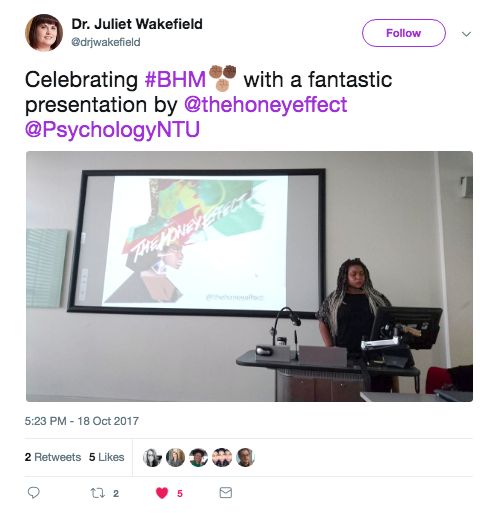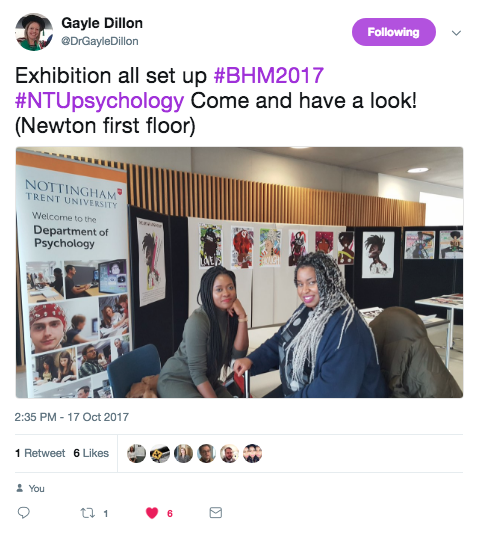“You can’t help it. An artist’s duty, as far as I’m concerned, is to reflect the times.”― Nina Simone
The Psychology department of Nottingham Trent University in Nottingham U.K. were looking for a creative that they could collaborate with on the topic of black women and their black hair to produce an event. One of the reasons that I was recommended to them because of this…
Contemporary Natural Hair by the Pickyheads:

Contemporary Natural Hair by the Pickyheads is a facebook group/blog that I initially created in order to counteract the sheer lack of contemporary representation of black beauty. Another reason why I created the group is that I wanted to re-brainwash myself into loving myself aesthetically eg. my natural afro hair texture and skin tone. Very quickly as I started to unearth more information about history, race theory, black feminism, visual sociology and ethnography and injected this into the group. I started to garner attention from people of African descent throughout the world. Im not saying Im famous by any stretch of the imagination but a friend of mine that lived in Belgium was told about my group by a Black Dutch woman who was gushing about it and my friend soon realised
‘but thats my friend Honey!!!?!!!’
I realised that the group could be used as a tool to
‘Dismantle racism, white supremacy, colourism and misogynoir, using all forms of artistic expression within contemporary culture. All with the emphasis of bigging up skin tones, hair textures, hairstyles of african heritage in order to decolonise beauty’
The Event: The Exhibition
I was asked by psychology department of Trent University and Esther Akanya Educational Developer (Success For All- Social Sciences) Centre for Academic Development & Quality at Nottingham Trent University to come up with an idea for an event that would link psychology to black hair. So I came up with the idea of creating an exhibition and a workshop called ‘The Art of Afrotherapy’: Decolonising beauty through art afro textured discussion.

Creating artwork with 0 funds is tricky especially when you’re covering a topic that is arguably a part of the reason why you have 0 funds #irony – but that is another blog post. I have used my years of experiencing the slow poison of the intersectionality between anti-black misogyny, fatphobia and hair texture discrimination and how that effects every facet of life eg. employment, relationships, social media. I also wanted to enthuse a sense of self care practised through creating art, music and also through facebook blogging, providing a space for a small part of a huge community of beautiful black women and images and links that centre our us, a reconnection with nature and black culture into my art.
I wanted a part of the exhibition to be immersive and so I invited the university to write their thoughts about black women, black women’s hair, the exhibition, and here are some of my favourite comments and images from the exhibition:
- ‘Our rich and saturated melanin! it indeed pops severely and they be MADD!’
- ‘Colourism is colonisation’
- ‘Dont Touch My Hair’
- ‘Black = beauty’
- ‘People who complain about my hair in their face while dancing, Bitch you just been blessed :-)’
I started with creating my art and in a short space of time I had created a collection of pieces that were about decolonising beauty plus the colonising minds and express. Started with creating some new pieces of art on a shoestring and collecting older pieces that tied in with the theme of the exhibition.
I wanted my work to feature womanity of african descent, the different skin tones and natural hair textures, I wanted to communicate a sense of vulnerability, endurance and the beauty within that.
The Event: The Workshop
In the U.K. and throughout the western world we are forced to conform to ideals of beauty and femininity that are racist white supremacist, patriarchal and anti-black.So in turn the afro textured natural hair that naturally grows from black people’s heads is often deemed unkempt, dirty, un-marriable, undateable, unemployable, rebellious, masculine and ugly. As opposed to men, it is still largely socially unacceptable for women not to have hair I’ve often wondered what effect this is having on women of African descent as it is seldom measured, analysed, unpacked and discussed not even nearly enough in the UK, especially outside London. Coupled with the fact that many black women are often culturally socialised to be self sacrificial and are often expected to hold families, churches and communities together often resulting in a degree self neglect but this level of self sacrifice it is not reciprocated. I have often wondered what effect does this have on the psyche and wellbeing of women of african descent in the uk?

There is a sizable population of women of African Caribbean descent that were born in Nottingham (largely of Jamaican descent and West African descent). Nottingham’s boasts 2 prestigious University’s both Nottingham University and of course Nottingham Trent University, both attract students from all over the globe. I wanted to to provide a space within Nottingham Trent University that would act as a place for black women and others to vent their views on the topic of black hair, beauty and how it feels to be a black woman in the uk as there is catharsis in airing this topic usually hidden in plain sight.
I created a presentation that aided the discussion, culminating in sharing examples of black girl magic enthused artistic expressions of self care such as recording artists: Solange’s song ‘Don’t Touch My Hair’, Jamila Wood’s ‘Holy’, Soul II Souls’s ‘Back to Life’ and powerful imagery of intoxicatingly beautiful natural haired fashionistas from the Afropunk Festival based in Brooklyn NY but now worldwide. Resulting in a brilliantly nourishing, amusing, intimate and enlightening conversation. The changes that I would make to the workshop are that Id make it much more art based as I feel that there is a toxic amount of subliminal emotion tightly compacted and stored away within the intersectionality between British politeness, patriarchy and misogynoir… still to be unpacked.



















